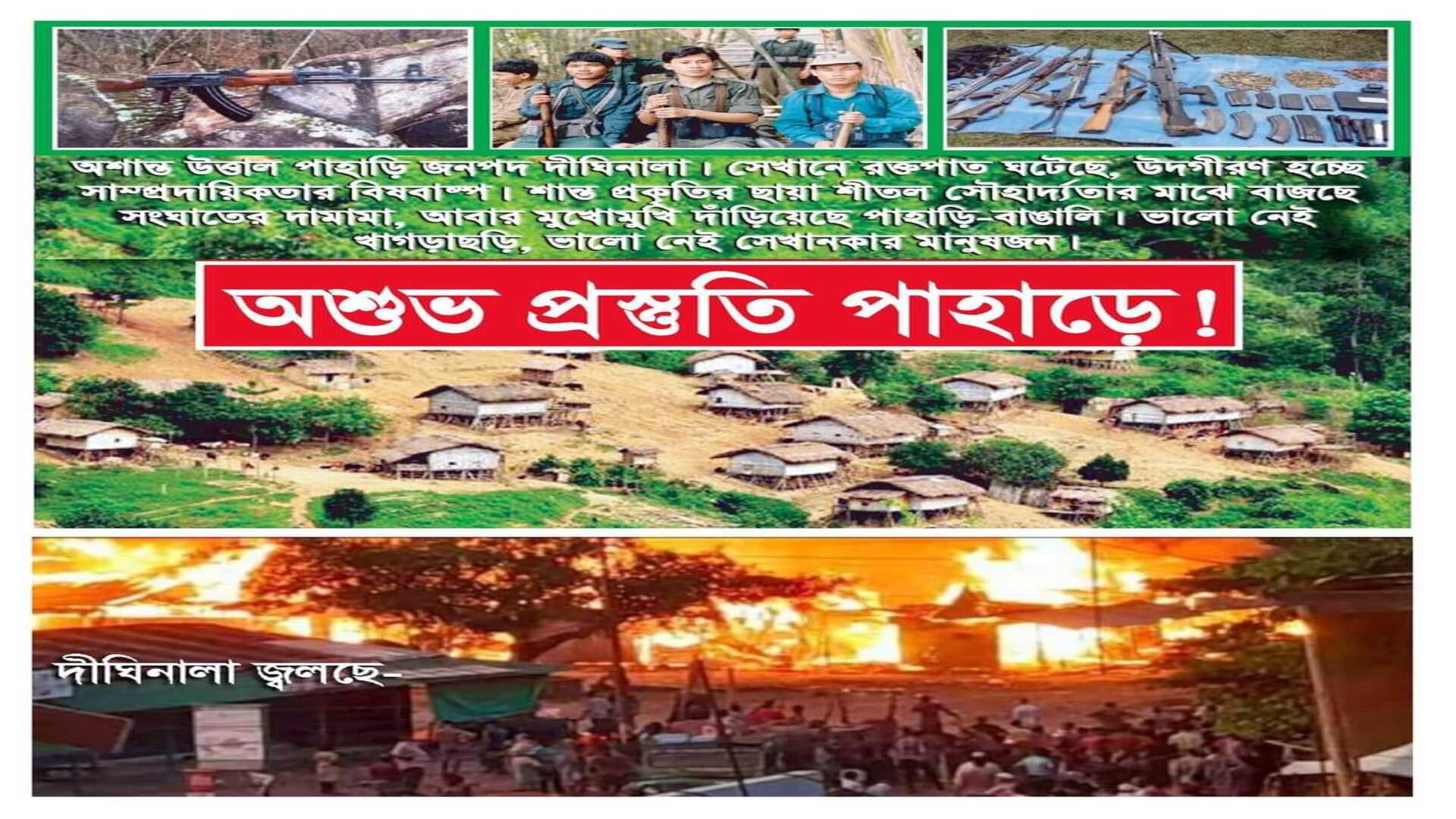
What’s Happening in the Hills? Who’s Taking Advantage?

The once peaceful region of Dighinala in the Chittagong Hill Tracts has turned turbulent, with bloodshed and the spread of communal hatred. The once calm and serene hills have turned into battlegrounds of conflict, with the indigenous communities and settlers at odds. Khagrachari is in turmoil, and its people are suffering.
There have been incidents of vandalism, arson, and destruction of homes and shops in various areas of Khagrachari, including Madhupur, Mahajanpara, Dighinala, and Babuchhara.
The unrest began after a settler Bengali youth was reportedly killed, triggering widespread chaos that quickly spread across the hills. The question remains: who is responsible for the unhindered violence, and who is benefiting from the disorder? Urgent compensation for the affected families and a thorough investigation are now imperative.
On Thursday night, massive clashes between the indigenous hill people and Bengali settlers left at least three dead and over 30 injured from both sides. Numerous homes and shops were set on fire. Among the dead are Dhan Ranjan Chakma (50), Rubel Tripura (20), and Juran Chakma (20). Rubel and Juran were killed in a shooting incident in Narankhaya area, while Dhan Ranjan Chakma died after being shot during the conflict.
The ethnic violence has also spread to Rangamati, where another person was reportedly killed. Tensions are running high in Bandarban as well, where the role of the JSS and local security forces is causing confusion among the residents. The authorities must take strong measures to put an end to the violence.
The Media’s Failure
For decades, the greater Chittagong Hill Tracts have been plagued by unrest and a deeply fractured environment. The region, which is an integral part of Bangladesh, has seen endless hostility and violent clashes between the marginalized indigenous people and Bengali settlers. Countless lives have been lost, and the once lush green hills are stained with blood. Both sides accuse each other of severe human rights violations, and at times, the military is blamed for everything.
Despite the numerous media outlets in the country and the abundance of investigative journalists, no one has truly brought to light the underlying causes of the ongoing conflict in the hills or suggested effective solutions. Whenever an investigative team has ventured into the region, they either return supporting the settlers or come back as sympathetic advocates for the indigenous people. Yet, the core issue remains unresolved, festering like an open wound.
My Friend Prasit, Be a Part of History!
In the wake of the isolated incident in Dighinala, it is said that the United People's Democratic Front (UPDF) has been flexing its muscles. This armed extremist group, led by my friend of 23 years, Prasit Khisa, seems to have gained unusual strength. With the fall of the ruling party and the rise of BNP’s influence, has your group, Prasit, become supernaturally empowered?
For now, pause the bloodshed, my friend. Instead, come forward and contribute to the nation-building process. If you play an active role in shaping the future, the indigenous communities will remember you for centuries.
India Exploits Every Opportunity
Whenever we express solidarity with the freedom fighters in Manipur, India unleashes armed extremist groups in the Chittagong Hill Tracts. When we speak out against the mistreatment of the desperate and oppressed Mizos, India sends heavily armed Kuki-Chin forces to Bandarban to carry out massacres.
Even though we advocate for peace and stability, and refuse to aid or harbor more than two dozen armed insurgent groups, including ULFA, NDFB, A’chik National Volunteers, Bodo Rebels, NLF, and PLA, the situation remains tense. We do not even grant these insurgent groups the minimal shelter they seek in the no-man’s land along the borders. Yet, if we were to do so, India would quickly descend into chaos across states like Tripura, Mizoram, Assam, Meghalaya, Arunachal, Manipur, and Nagaland.
Realistically, maintaining peace in our hill regions is becoming increasingly difficult without pushing India into its own form of instability.
Publisher : Mustakim Nibir
© All rights reserved © The Times Of Dhaka